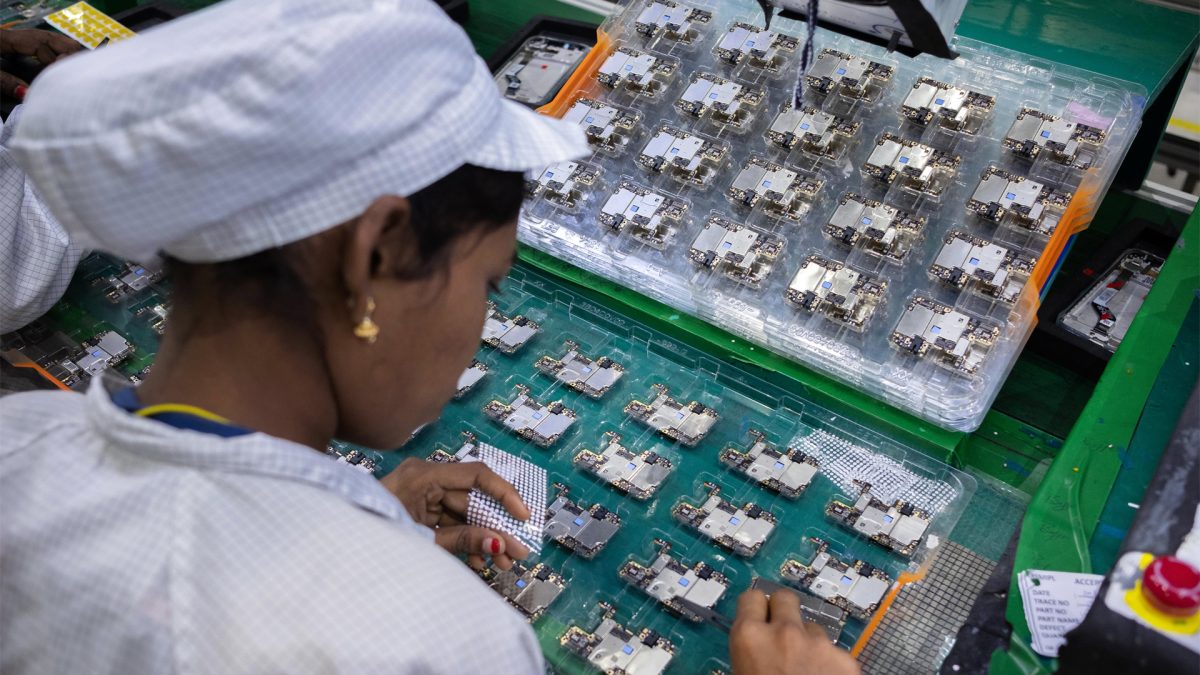One of the ways Foxconn’s HR justified this discriminatory practice was by stating that traditional jewellery worn by married women, such as metal toe rings and necklaces, could lead to potential electrostatic discharge that could damage iPhone components. read more
)
Representative image of a woman, working in a smartphone factory. Credit: AFP
A recent investigation has brought to light discriminatory hiring practices at Foxconn’s Sriperumbudur iPhone assembly plant in Tamil Nadu, revealing a troubling trend of systematically excluding married women from employment opportunities.
As per a report by Reuters, Foxconn, a major manufacturer of Apple devices, is accused of discriminating against married women in India, citing their family responsibilities and traditional jewelry as barriers to their employment.
The age-old problem, with a new twist
The report tells the saga of Parvathi and Janaki, two sisters in their 20s from a nearby village, who travelled to the Foxconn plant in March last year, after coming across ads for vacancies at the iPhone plant. on WhatsApp. Upon arrival, a security guard asked if they were married. Parvathi claims that they were denied employment because of their marital status, and alleged that even the auto-rickshaw driver who dropped them to the facility had warned them that married women were not hired at that plant.
S. Paul, a former HR executive at Foxconn India, confirmed these claims, stating that Foxconn’s management verbally instructs hiring agencies to avoid recruiting married women. Paul, who left Foxconn in August 2023, stated that the company believes that the tendency for married women to come across family obligations and have babies could lead to higher absenteeism.
Several reasons were cited for this discriminatory practice, ranging from concerns that “women have babies after marriage” to worries that family duties could interfere with work.
Additionally, traditional jewellery worn by married Hindu women, such as metal toe rings and necklaces, was cited as a potential risk for electrostatic discharge that could damage iPhone components.
Current and former Foxconn HR executives told Reuters that electrostatic discharge could occur when metals come into contact with phone components, potentially damaging them. This technical concern is one of the justifications for excluding married women from the workforce.
Resistance by some
Despite these discriminatory practices, some women have managed to secure employment by concealing their marital status and removing their jewellery before entering the Foxconn campus. This workaround highlights the desperation and lengths to which women are willing to go to obtain jobs.
Apple and Foxconn, whose policies prohibit discrimination in hiring based on marital status, have denied these charges. However, multiple sources within Foxconn and its associated recruitment agencies confirmed the exclusionary policy. They cited concerns about traditional jewelry worn by married Hindu women, such as metal toe rings and necklaces, which could interfere with the manufacturing process or pose security issues related to theft.
While Foxconn’s policy, cannot have such conditions for hiring on paper at least, it should be noted, that the manufacturing giant has employed married women previously, especially during peak production periods. These instances are exceptions rather than the norm. Some agencies have even helped candidates conceal their marital status to secure employment.
Apple and Foxconn have acknowledged while responding to these lapses in their hiring practices during 2022 and claim to have taken corrective measures. However, the Reuters investigation revealed that such discriminatory practices persisted through 2023 and into 2024.
There could be legal challenges as well. A 1965 Supreme Court ruling stated that married women cannot be fired on grounds of absenteeism, suggesting that Foxconn’s practices might be legally questionable.
Foxconn’s tarred history with labour law violations
This is not the first time Foxconn has come under scrutiny for dubious practices. In 2021, protests broke out in Sriperumbudur after over 250 workers suffered food poisoning, with over a hundred hospitalized.
Apple put the plant on a short probation in the aftermath of the incident, asserting that it maintains “the highest supply chain standards in the industry” and noting that Foxconn does employ some married women in India.
The revelations come at a time when the Indian government, under Prime Minister Narendra Modi, is trying to attract multinational investments to boost the economy and improve labour standards. India is expected to account for about 9 per cent to 14 per cent of iPhone production globally this year compared with 86 per cent to 91 per cent in China.
In such a scenario, Foxconn’s video of excluding married women from job opportunities at Foxconn challenges these efforts and reveals the complexities corporations face in aligning their global standards with local practices.

 2 months ago
26
2 months ago
26
)
)
)
)
)
)
)
)
)
)
)
)
)
)
)
)
)
)
)
)
)
)
)
)
 English (US) ·
English (US) ·